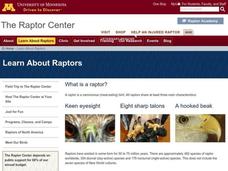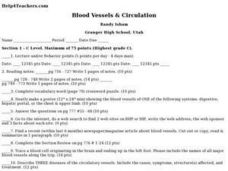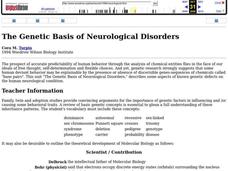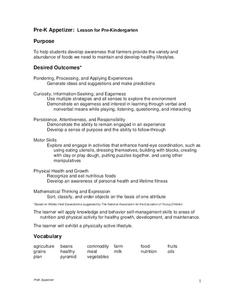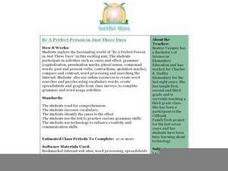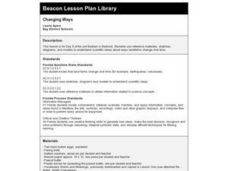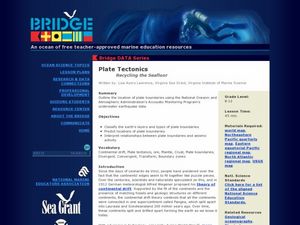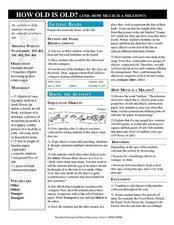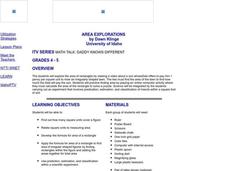Curated OER
The Rain Forest
Learners explain the basics of the tropical rain forest ecosystem. They list the four general layers of vegetation found in the tropical rain forest.
Curated OER
The Rain Forest
Students acquire knowledge about the basics of the tropical rain forest ecosystem. They analyze the cause/effect relationship between humans attitudes and behavior and the evnvironment. Students list the four general layers of vegetation...
Curated OER
Native Americans and Topography at Rose Bay
Students visit a wetland ecosystem. While they are there, students explore how to read topography maps of Rose Bay.
Curated OER
Blood Vessels & Circulation
Students participate in a layered curriculum designed lesson in order to study the cardiovascular system of the human body. The assessments and activities are student centered.
Curated OER
The Genetic Basis of Neurological Disorders
Pupils explore neurological disorders. They examine the presence and absence of discernible genes. Students describe neruological diseases and draw faces of affected persons. They play a human neurology disorders learning game.
Curated OER
Unit 3 Cell Structures: Cell Theory & Organelles
Students examine cell structures in depth. They decide what grade they want to work for and do the assignments for that grade. They complete various assignments on cell theory and organelles.
Curated OER
Pre-K Appetizer
Students understand there are healthy and not healthy food choices. In this food pyramid lesson, students learn to make healthy choices by playing a traffic light game. Students recognize raw foods from the farm may not be ready for...
Curated OER
Brillant, Beautiful Bats!
Students use the internet to gather information on bats. They write their own bat poem and describe the differences between the parts of a bat's body. They identify how bats are important to humans and how they control the insect...
Curated OER
Native Americans at Rose Bay
Young scholars examine the Timken Native Americans of the 1400s and their culture of hunter-gatherers. They study the necessary vocabulary using a number of activities.
Curated OER
Language Arts: A "Perfect" Lesson
Pupils read "Be A Perfect Person in Just three days," and participate in a host of activities. Connected to technology, they use online sources to create word searches and puzzles from vocabulary words. In addition, students create...
Curated OER
Investigating Sources-Artifacts
Students discuss artifacts. In this social science lesson, students realize that artifacts can help one in determining about the person the artifacts belonged to. Students will be put into small groups and will look at objects from a box...
Curated OER
Changing Ways
Third graders examine hard boiled eggs as possible models for the earth's layers.
Curated OER
It's A Jungle Out There!
Students report on an animal according to its appearance, habitat, and characteristics.
Curated OER
FORCES, MOTION, AND ENERGY
Eighth graders engage in a variety of activities in order to investigate the basic concepts of physics. They read and answer questions in a written text. This is only one type of activity that is part of many others.
Curated OER
The Excursion
Students throw dice and make their way around a board, answering questions, performing tasks and finding out about the environment as they go.
Curated OER
How Do We Learn About the Past?
Sixth graders discuss the role of an archaeologist as a class. After viewing photographs, they relate the objects found in their local area and Ancient Egypt. They draw a picture of an object that represents their own culture and gives...
Curated OER
Plate Tectonics: Recycling the Seafloor
Students classify earth's layers and plates using Ocean Seismicity data. In this plate tectonics lesson, students outline where the plate boundaries are on the world map. They then compare these predicted boundaries with USGS map of the...
Curated OER
The Genetic Basis of Neurological Disorders
High schoolers describe some aspects of known genetic defects on the human neurological condition. They participate in a variety of exercises including drawings, games, and analogies.
Desert Discoveries
How Old is Old? (And, How Much is a Million?)
Here is an interesting lesson on how old things are designed for young scientists. In it, learners compile a list of their birthdays, and the class puts them in sequential order from youngest to oldest. Then, they sequence 15 objects...
Curated OER
Area Explorations
Students explore the area of rectangles. They practice finding area by playing an onliine computer activity where they calculate the area of a rectangle to solve a problem.
Curated OER
Just the Facts! Exploring Order of Operations and Properties of Real Numbers
Sixth graders explore the concept of order of operations. In this order of operations activity, 6th graders view a powerpoint about order of operations in society. Students post on a blog about order of operations.
BioEd Online
Bio Ed Online: The Science of Microbes: Defending Against Microbes
Students learn about the immune system and complete a crossword puzzle to practice vocabulary. The lesson and a set of PowerPoint slides can be downloaded. Includes an instructional video on immune system vocabulary terms [7:13]
